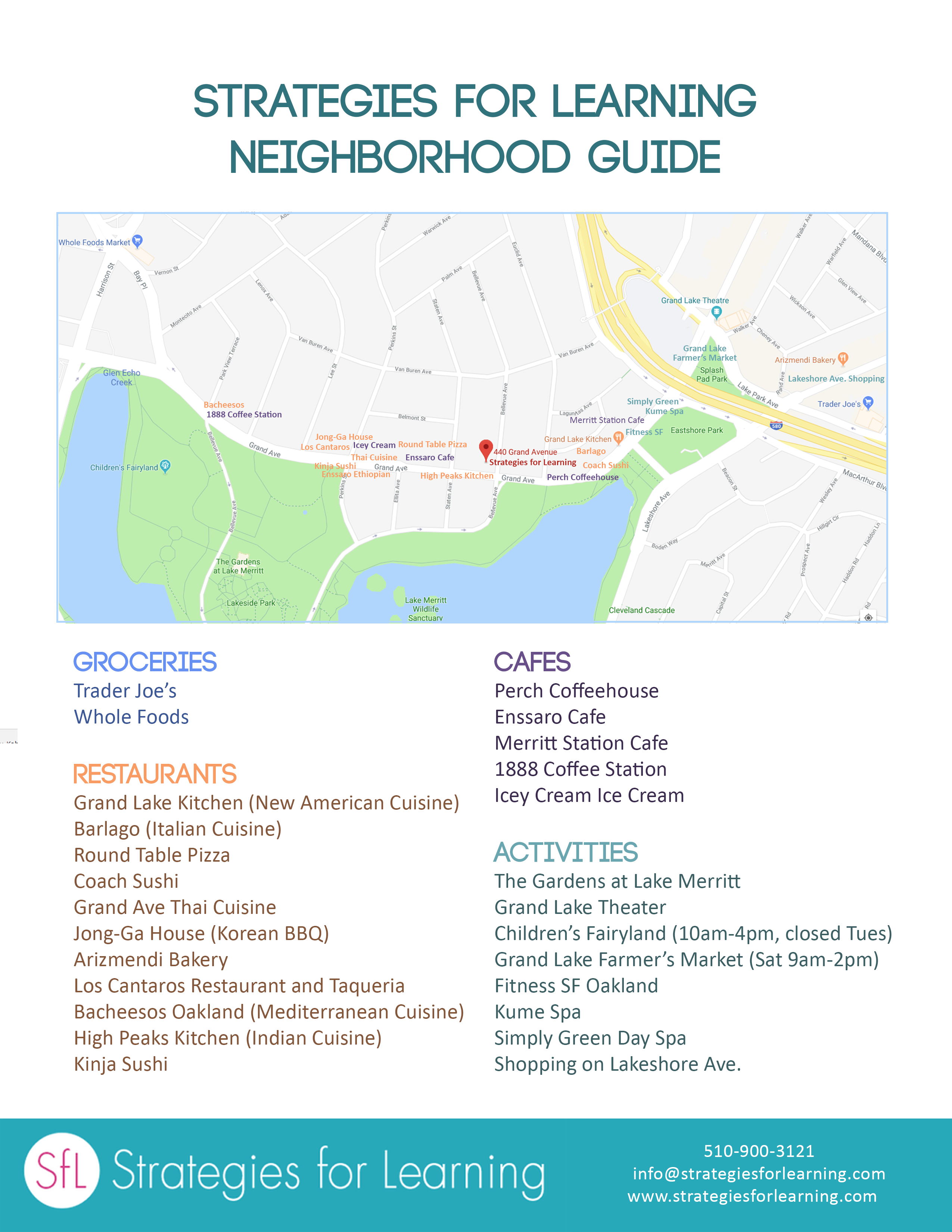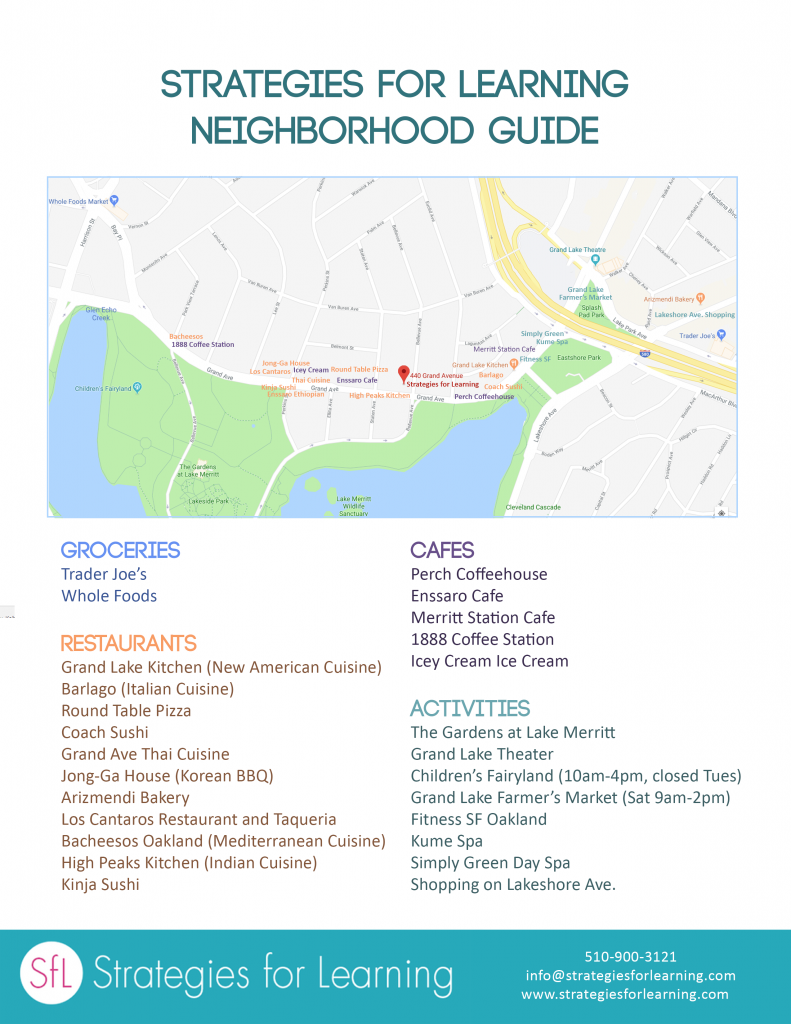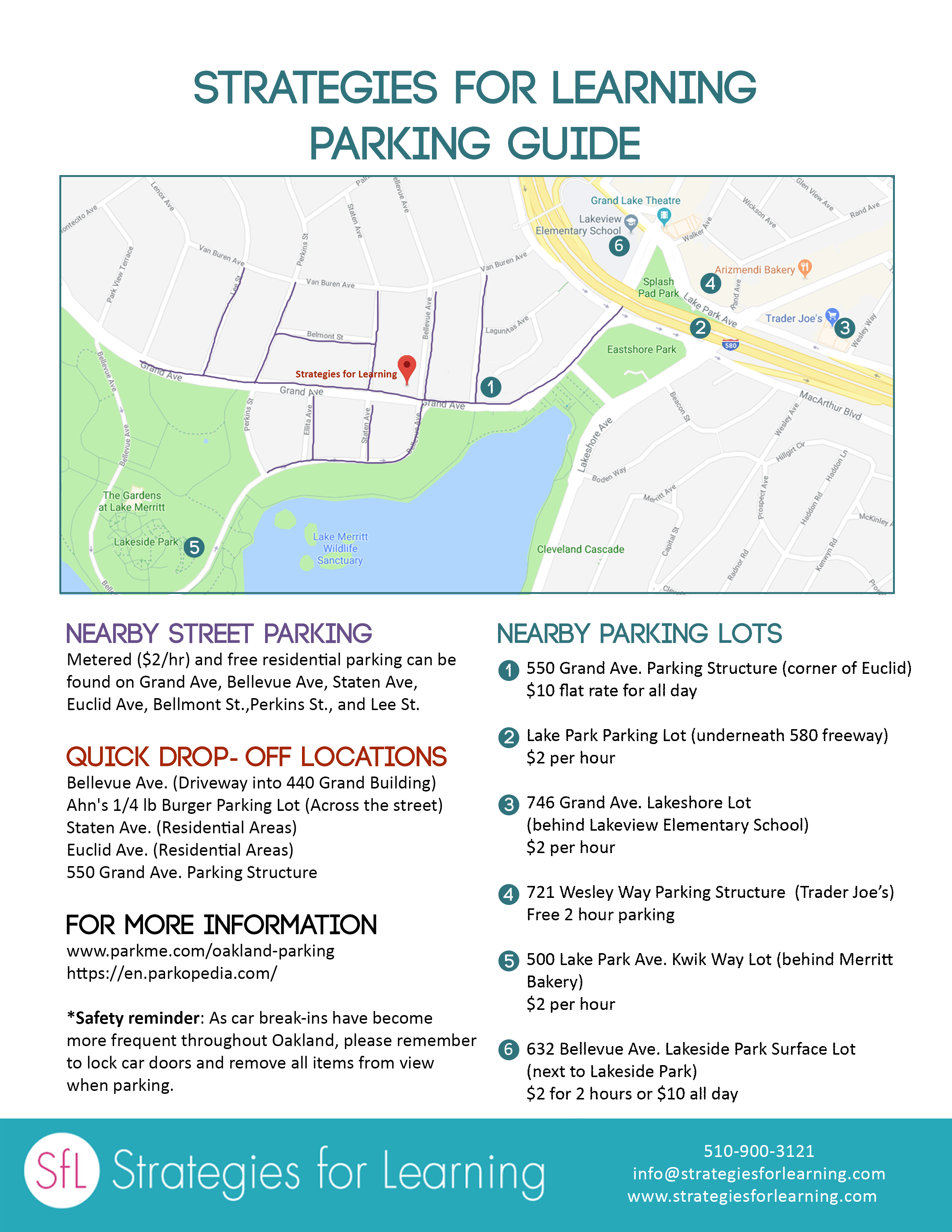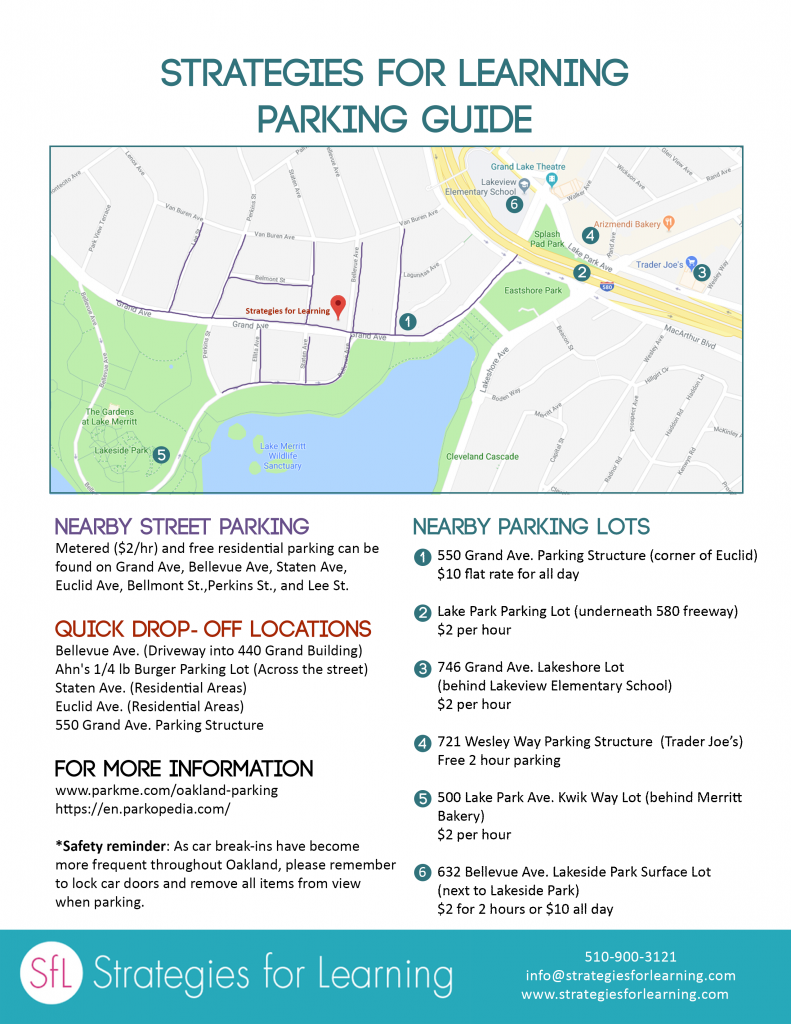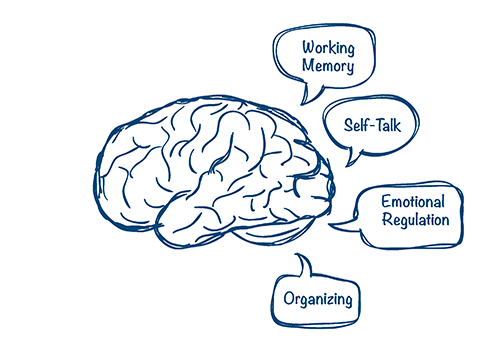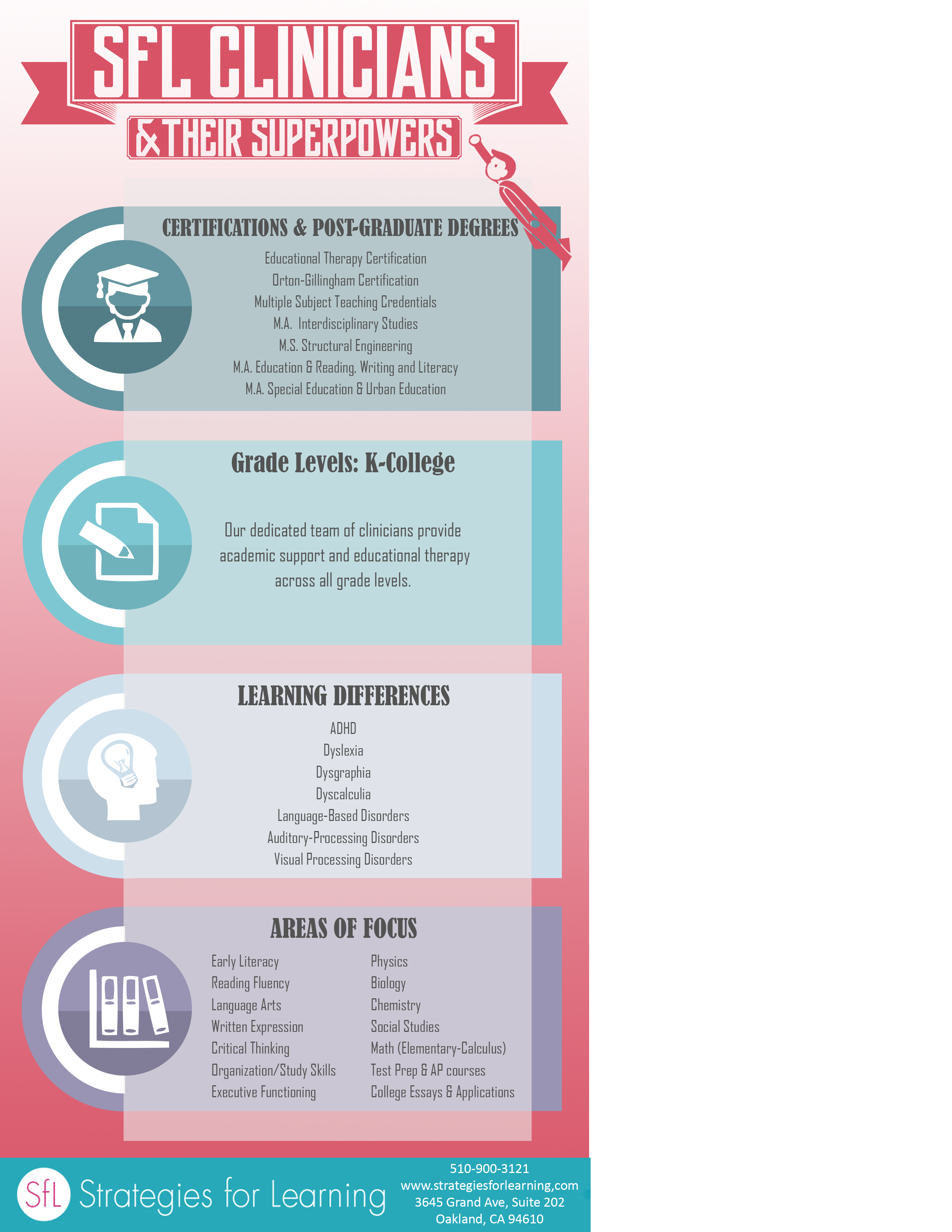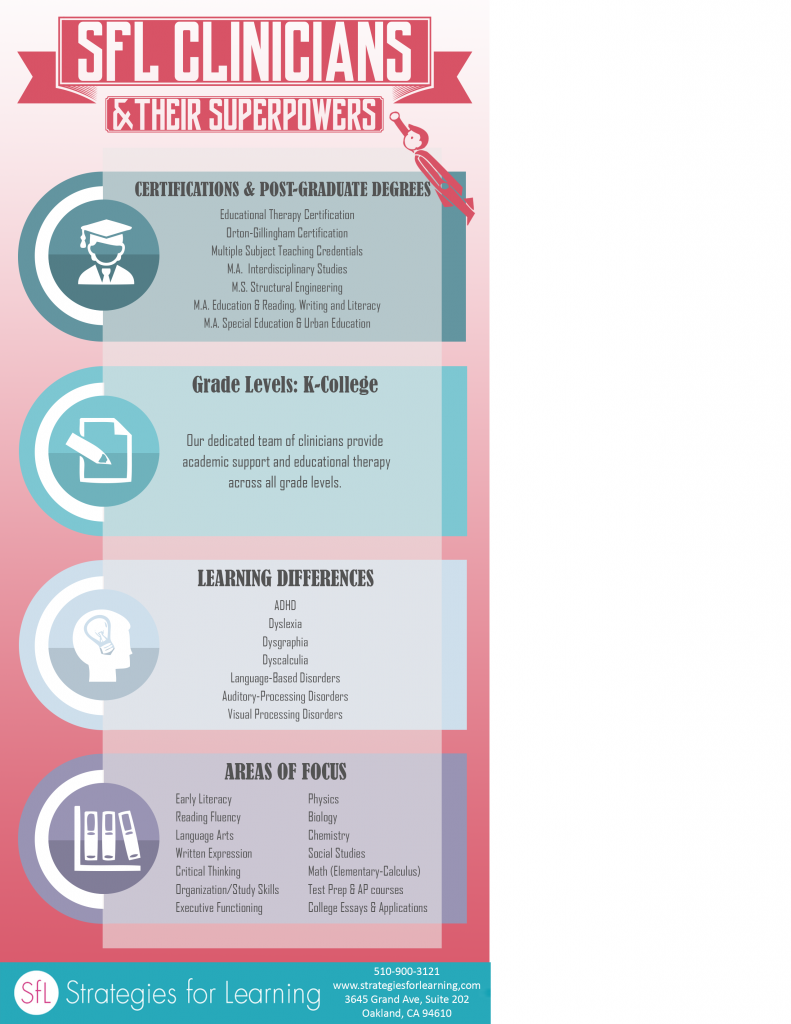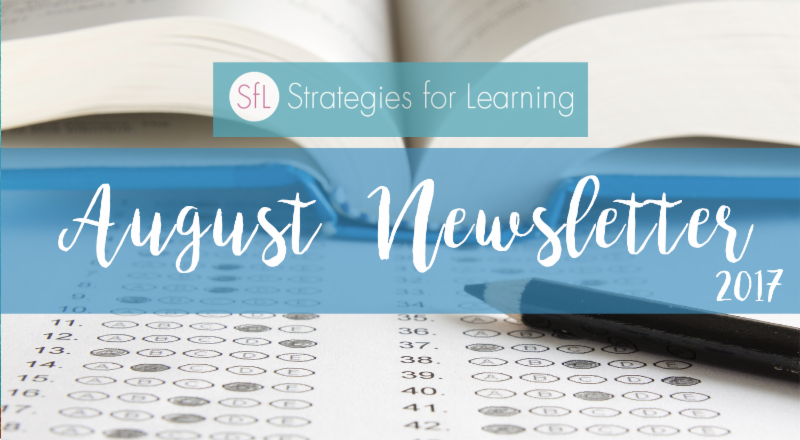No products in the cart.
SFL Parking Guide
We are moving to a new location!
The ABCs of Improved Summer Reading
The ABCs of Improved Summer Reading
Access to books. It’s critical that kids have access to a wide variety of books over the summer months, but we know that access alone doesn’t make a strong impact.
Books that match reader’s ability levels and interests. For young people’s reading skills to improve, they need to read books that align with their own reading levels. Reading books that are too easy or too hard won’t help!
Comprehension, as monitored and guided by an adult, teacher or parent. The most important piece to making summer reading effectively is the help of an adult who can ask questions and guide kids to better understand what they are reading.
A guide from the National Summer Association
Author: James Kim, assistant professor of education, Harvard University
Executive Function of the Brain: Key to Organizing, Managing Time and More
Article from American Psychiatric Association
Executive Function of the Brain: Key to Organizing, Managing Time and More
You may have heard the term executive function in regards to the brain, but what does it mean when a person has difficulties with executive function? Executive function is a set of mental processes that helps us get things done. It allows us to plan and organize and to link our past experiences to the present. Executive function is sometimes described as the CEO of the brain — in charge of making sure things get done.
Executive function helps people:
- Manage time
- Pay attention and switch focus
- Plan and organize
- Remember details
- Do things based on experience
People with executive function problems may have difficulty planning or managing time, evaluating ideas, finishing work on time, or keeping track of multiple things at once. They may have trouble telling a story or relaying details in an organized way.
Larry Silver, M.D., writing in ADDitudeMag.com, provides some examples of executive function problems: a person with executive function problems might read a chapter, but not retain what he read; he might know the material, but be unable to write an answer or start a paper because he cannot organize his thoughts; or he might be able to calculate math equations, but make frequent careless errors.
People with ADHD, depression, learning disabilities, and autism often have difficulties with executive function. Alzheimer’s disease or brain damage (for example from concussion or stroke) can also affect executive function. Some research has found an association between OCD and problems with executive function.
People with no executive function impairment can experience temporary problems. For example, being overly stressed, sad, or sleep-deprived can hinder a person’s executive function ability.1
While there is no single test to identify executive function problems, psychologists can use a variety of tests and methods to assess difficulties with executive functioning and can make recommendations for how to address specific areas of weakness. Tests may look at specific skills, such as working memory, attention, ability to shift focus and ability to plan and organize. Problems often become apparent in children during early elementary years as children are expected to complete more schoolwork independently, according to the National Center for Learning Disabilities.
There are some things that can be done to improve executive function, and strategies and approaches that can help to cope with executive difficulties.
Executive function can be improved at any age, including in the elderly, researcher Adele Diamond, Ph.D., professor of developmental cognitive neuroscience with the University of British Columbia notes in a recent review article. For example, improving physical fitness can improve executive function in the elderly. Research has found improvement in children’s executive function with computerized and interactive games, task-switching computerized training, and Taekwondo traditional martial arts.
Educational strategies and behavioral approaches for addressing executive function difficulties, suggested by the National Center for Learning Disabilities, include:
- Take a step-by-step approach, break down long assignments into chunks
- Use visual schedules and review them frequently
- Create checklists and “to do” lists
- Organize work space and minimize clutter
- Schedule a weekly time to clean and organize
- Meet with teacher/supervisor on a regular basis to review work and troubleshoot problems
Reference
- Diamond, A. Executive Functions. Annual Review of Psychology. 2013; 64:135-168. https://www.ncbi.nlm.nih.gov/pmc/articles/PMC4084861/
Resources
- Understanding Executive Functioning Issues – Understood (A program of a group of 15 nonprofits working to provide parents information on learning and attention issues)
- Executive Function Fact Sheet – National Center for Learning Disabilities
Source: “Executive Function of the Brain: Key to Organizing, Managing Time and More.” Executive Function of the Brain: Key to Organizing, Managing Time and More, American Psychiatric Association, 19 Jan. 2017, www.psychiatry.org/news-room/apa-blogs/apa-blog/2017/01/executive-function-of-the-brain-key-to-organizing-managing-time-and-more
SFL Clinicians and Their Superpowers
Homework Help for ADHD
Article from CHADD – The National Resource on ADHD
Homework can be a source of frustration and difficulty particularly for students with ADHD. As a parent, you can help lessen that frustration by creating an organized and comfortable space within your home for your child to do homework. This might be a kitchen table, desk, or even a floor mat. The best space is one where your child can be near you or another adult but yet have minimal distractions.
With a designated homework space, your child can get into the homework habit each time they sit down to do their homework. Your child begins to associate that space with being focused and productive and learns how to organize and structure his or her time and thoughts.
The following tips can help you set up the space:
- Involve your child in setting up the space to help figure out what works best for him or her early in the school year.
- Make sure your child has all the necessary materials to do his or her homework (paper, binders, calculator, rulers, pencils, pens and erasers) and, if possible, an extra set of school books for home.
- Color-coded folders or ones with different patterns are very helpful in reminding your child what goes where. Some students find it helpful to have a folder for completed homework assignments that travels back and forth to home and school.
- A portable homework station like a basket with supplies can help when your child prefers to study on a floor mat, a sofa, or at a table near you.
- Remove or minimize things that distract or cause stress, such as facing away from the doors and windows or removing the television.
- Keep pets in another room.
- If possible find an open space or accessible room with good lighting. Although some kids like to do their homework on the floor, having an uncluttered table or desk available is a good idea.
- Pick the space so that you can keep an eye on your child but do not hover over your child.
- Provide a timer or a silent clock to help your child know the difference between work time and break time.
- Your child may work better with predictable background noise or music without words than complete silence. Try it out with your child to see what works.
- Some children work better if they are able to stand or move around/walk while doing activities such as reading, memorizing, or being quizzed. Try it out with your child to see what works.
- Check in throughout the year to see what’s working for your child and if the space needs to be adjusted to help your child work better.
Additional Homework Tips:
- Get your child a planner to record daily homework assignments and reminders.
- Show your child how to file loose papers into specific folders (for example: math, reading, parent signatures, science, completed homework, and incomplete assignments).
- Involve your child in setting up ways to organize their belongings, including the book bag, folders, binder, and assignments so they can keep track daily of their school work on their own.
- Establish a designated homework time for each day (consistency is key!).
- For younger children and older students who need extra help organizing, help them by going through their assignments with them. Show them how to read all the directions carefully:
- Use colored pens or highlighters to highlight the main parts, questions, and instructions. Highlighters, colored pens, and sticky notes can also be used by the student to double check their own work.
- Have your child re-read the assignments for better understanding.
- Write important information down so your child can reference it again.
- Work with your child to organize homework assignments into manageable parts:
- Divide big assignments into smaller ones.
- Use a calendar to help plan for larger assignments; this helps model how to plan and breakdown larger assignments.
- Work on one section at a time.
- If your child has difficulty with handwriting, using drafts or dictating ideas and then writing them down from the dictation can help. Your child can break down parts or directions by thinking of ideas and recording them, then listening to the recording to organize before writing everything in order.
- Use a timer to manage attention:
- Schedule 5–10 minute breaks to allow time for your child to move around and grab a healthy snack and drink to energize.
- Work with your child to see when and how often breaks are needed.
- Check homework with your child.
- Praise your child for effort and be specific in your praise:
- Give positive feedback to show you are noticing his or her effort and perseverance.
- Remain optimistic, patient, and hopeful. Take a break yourself if you need it.
- Reward your child’s effort to continue trying his or her best with specific and concrete praise.
- Instead of saying “good job,” say “I like how you kept trying even when the math problems became harder.”
- Replace “you are doing great!” with something more concrete so they know what they are doing well “You went back to re-read the question to check your work; that extra step was a great idea!”
- Continue to monitor your child’s work and study skills and habits to find out what’s working or not working and adjust accordingly.
- Communicate with your child’s teacher if you notice any patterns or things that work or that are challenging for your child during homework tim
Source: CHADD – The National Resource on ADHD. “Homework Help for ADHD | CHADD.” CHADD – The National Resource on ADHD, www.chadd.org/Understanding-ADHD/For-Parents-Caregivers/Education/Homework-Help-for-ADHD.aspx.
References:
Dolin, A. (2010). Homework Made Simple: Tips, Tools, and Solutions for Stress Free Homework. Advantage Books: Washington, DC.
Low, K. (2014). Homework Help for Students with ADHD. About Health. Retrieved from:http://add.about.com/od/childrenandteens/a/Homework.htm
Segal, J. & Smith, M. (2016). ADD/ADHD and School. HelpGuide.org. Retrieved from:http://www.helpguide.org/articles/add-adhd/attention-deficit-disorder-adhd-and-school.htm#homework
Zentall, S.S. & Goldstein, S. (1999). Seven Steps to Homework Success. Specialty Press, Inc.: Plantation, Florida.
SFL Newsletter | Nov 2017
Check out our clinician spotlight corner along with noteworthy events and campaigns happening at our clinic!
November 2017 Newsletter
SFL Newsletter | Aug 2017
Sucess does not come with luck. Gear up for autumn test prep! You’ll find information on proven test-taking strategies for students with learning differences, test accommodations, and excellent resources for test preparation!
August 2017 Newsletter
SFL Newsletter | June 2017
June is all about literacy! Get access to our SFL-approved summer reading guide as well as practical strategies for boosting literacy!

